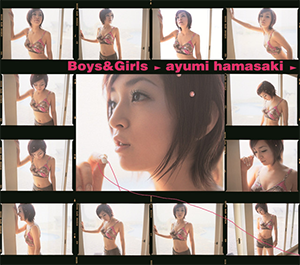"Alone in My Room", like Ami's first single, "Love the Island", was used by the Japanese Government to promote winter tourism on the island of Guam. The song was also used multiple times as the opening theme of ASAYAN, a television show.
The complete single, including all its tracks, were creations of Ami's music mastermind in the Sony days, Tetsuya Komuro. Two of the remixes bear the initials T.K. because of this.
The single was the first one released by Ami in Maxi Single format, including more than three songs on it. The maxi CD was housed in a J-card-type 12 cm slimline single case. The case used was 7 mm thick, showing artwork through the front, and also through the spine and part of the back of the case. The CD itself was inserted upside-down, allowing the artwork on the disc itself to show through the transparent back of the case. The CD also included an obi that advertised Suzuki's previous single.
Following her blacklisting from the music industry in September 2000, production and distribution of the single stopped in its entirety.
A maxi single or maxi-single is a music single release with more than the usual two tracks of an A-side song and a B-side song.

Ami Suzuki is a Japanese recording artist, DJ, and actress from Zama, Kanagawa, Japan. Having been discovered at the talent TV show Asayan, she was one of the most popular female teen idol in the late 1990s. However, in 2000, Suzuki faced legal problems with her management company resulting in a controversial blacklisting from the entertainment industry. Suzuki attempted to resurrect her career under her own steam with two indie singles before signing to Avex Trax in 2005. She released "Delightful", a dance song that reached No. 3 on the Japanese Oricon charts with a style similar to electronic club music, significantly different from her pop idol days. Since her appearance in the 2006 film Rainbow Song, Suzuki has gradually made a name for herself in the acting field, starring in various movies, television series, and musicals.

Around the World is the debut album by Ami Suzuki under label Avex Trax. Ami released a single by the same name on the same day.

Fun for Fan is the first best of album released by the Sony Music label for Japanese singer Ami Suzuki on May 30, 2001.

"Love Machine" is Morning Musume's 7th single, released on September 9, 1999 as an 8 cm CD. It sold a total of 1,646,630 copies, making it a massive hit and their highest selling single. In 2004, it was re-released as part of the Early Single Box and again in 2005 as a 12 cm CD. The single also marked the debut of the "Third Generation" member Maki Goto and the departure of Aya Ishiguro.

"Boys & Girls" is a song recorded by Japanese recording artist Ayumi Hamasaki, serving as the fourth single for her second studio album, Loveppears (1999). It was released by Avex Trax in Japan and Hong Kong on July 14, 1999, and through Avex USA in North America in early 2001, while being re-distributed in 2003. "Boys & Girls" marks Hamasaki's first single to be made available for purchase as a maxi single with additional remixes. The track was written by the singer herself, while production was handled by long-time collaborator Max Matsuura. Musically, the song is a dance recording, a genre that heavily influences Loveppears. The single's lyrical content is written in third-person perspective.
"White Key" is the fourth single released by Japanese singer Ami Suzuki under music label Sony Music in December 1998.
"Hopeful" is a song by Japanese recording artist Ami Suzuki, taken from her fourth studio album Around the World. The up-tempo, dance-pop song was written by Ami Suzuki (lyrics) and Shunsuke Yazaki (music).

"Can You Celebrate?" is Namie Amuro's seventh solo single under the Avex Trax label. Released on February 19, 1997, "Can You Celebrate" is the best-selling single by a solo female artist in Japanese music history, with sales of 2,296,200 copies.
"Love the Island" is the debut single of Japanese singer Ami Suzuki released on July 1, 1998 through True Kiss Disc, sub-label of Sony Music Entertainment Japan owned by Tetsuya Komuro.

"All Night Long" is a song recorded by Japanese singer Ami Suzuki for her debut studio album, SA (1999). It was written and produced by Japanese producer and songwriter Tetsuya Komuro. The track was released following Suzuki's two collaborative efforts with Komuro. "All Night Long" premiered on November 5, 1998 as the third single from the album.
"Be Together" is a song from Japanese band TM Network, written by Mitsuko Komuro and composed by Tetsuya Komuro, it was included in their fifth album Humansystem. Despite the fact that it wasn't released as a single and was not popular at its initial release, the 1999 cover made by Ami Suzuki the song became very popular in Japan, and it has since been covered by several artists.

"Free Free" is a song by Japanese recording artist Ami Suzuki and producer Yasutaka Nakata, taken from her sixth studio album Dolce (2008). It was released on August 22, 2007 through Avex Trax and was distributed into three physical formats and for digital consumption. Additionally, the track appeared as a double A-side to "Super Music Maker", another recording by Suzuki and Nakata. Suzuki first started working with the producer in late 2006 after her staff at Avex noticed the singers engagement with dance-oriented music whilst performing at night clubs, and wanted to pair her with a musician that dealt with electronic dance music.

"One" is a song recorded by Japanese recording artist Ami Suzuki for her seventh studio album, Supreme Show (2008). It was written and produced by Japanese producer and Capsule member Yasutaka Nakata. The track is Suzuki's third single with Nakata after her August 2007 single's "Free Free" and "Super Music Maker". "One" premiered on June 18, 2008 as the lead single from the album.

"Can't Stop the Disco" is a song recorded by Japanese recording artist Ami Suzuki for her seventh studio album, Supreme Show (2008). It was written and produced by Japanese producer and Capsule member Yasutaka Nakata. The track is Suzuki's third single with Nakata after her June 2008 single "One". "Can't Stop the Disco" premiered on September 24, 2008 as the second single from the album.

Supreme Show is the seventh studio album by Japanese recording artist Ami Suzuki. It was released on November 12, 2008 by Avex Trax as her 10th Anniversary album. It was also released ten months after her joint project album, Dolce. Supreme Show is Suzuki's first album to be fully produced, composed, and arranged by Japanese musician and Capsule member Yasutaka Nakata. Suzuki contributed to the album as the lead vocalist, background vocalist, and co-songwriter for the track "Love Mail". With tracks recorded in both English and Japanese language, Supreme Show is an electronic dance music album.

"Reincarnation" is a song recorded by Japanese recording artist Ami Suzuki for her second greatest hits album, Ami Selection (2011). It was written by Emi Hinouchi and production was handled by Taku Takahashi. The track is Suzuki's first collaboration with both Hinouchi and Takahashi. "Reincarnation" premiered on February 25, 2009 as the lead single from the album. The CD and digital cover sleeve has a close-up of Suzuki hovering a GCI bubble. The DVD cover sleeve features a slightly altered version of the former.

"Wherever Would I Be" is a song by American rock band Cheap Trick, released in 1990 as the second single from their eleventh studio album Busted. It was written by American songwriter Diane Warren and produced by Richie Zito. "Wherever Would I Be" peaked at No. 50 on the US Billboard Hot 100.

"Super Music Maker" is a song recorded by Japanese recording artist and songwriter Ami Suzuki, for her sixth studio album Dolce (2008) and a re-recorded version for her seventh album Supreme Show (2008). Featuring Japanese record producer and Capsule member Yasutaka Nakata, the song was released as the lead single and double a-side single with "Free Free" from Dolce on August 22, 2007 through Avex Trax. Nakata had written, produced and arranged both tracks and is her first single to be handled by Nakata following later singles from her album Supreme Show (2008). Backed by synthesizers and keyboards, "Free Free" incorporates a new genre called "Eropop" with influences of electronic dance, house and disco music. The lyrical interpretation was based on the theme of erotica and freedom.
Tetsuya Komuro Archives refers to two separate box set releases featuring songs from various artists that were produced by the retired Japanese musician Komuro Tetsuya. They were released on June 27, 2018 by the Japanese record label Avex Trax. The box sets were released as Tetsuya Komuro Archives "T" and Tetsuya Komuro Archives "K", with each box set containing fifty songs divided into four separate discs.












